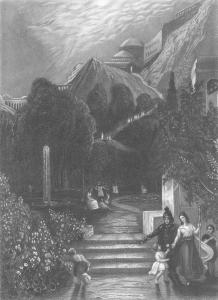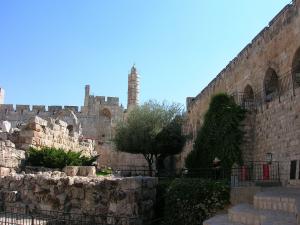
Here is a fun passage from the third section of Isaiah’s prophetic grab-bag collection, a group of oracles and narratives and poems that cover perhaps as much as 300 years of composition. This chapter 62 is certainly from late in the collection, but just when or under what circumstances it may have been written is impossible to determine. Suffice it to say that whoever wrote/spoke this material knew her Hebrew well and was having a right good time playing with the language.
For those of us privileged to be able to read Hebrew, it is a deliciously flexible tongue, chock full of rich possibilities for meaning and always available for a memorable pun or play of language or three. The Bible’s writers delight in having a ball especially with the names they use for certain characters. Who can ever forget the name of the second son of Abraham and first son of Sarah, Isaac, based on the word for laughter. Not only does Sarah say that her community will laugh with her at the birth of her son, since she is wildly past the age of childbearing, but all of us reading her grand tale even after all these centuries will join the chortling, too. After all, what else would you call a child born with Dad about 100 and his spouse in her 90’s, except laughter? And what about the horrid husband of Abigail, the savior of the furious David, who will later be David’s wife? The man’s name is “fool,” and Abigail uses that ridiculous moniker when she calms the raging David who is about to murder “fool” and all of his cohort. Then, too, there is Adam (the human one) and his companion Eve (the living one), and Jacob (the grabber), and Joseph (the increaser), among many others. The name game of the Bible is rife with insightful fun as people fulfill the promise of their names or their names lead them to become what their narratives suggest.
Here in Isaiah 62 the author plays this name game with a vengeance. A very general context for this passage might be reconstructed. Clearly, the writer is looking at or remembering Jerusalem in its former glory when the temple of Solomon gleamed on the hill of Zion and the palace of the king crowned the mighty rock of the city. But early in the 6th century BCE all that disappeared as the Babylonians sacked and burned the city, and even after some rebuilding occurred late in the same century, and early in the next, Jerusalem was never again to regain its splendor until centuries later under the aegis of the Greeks and Romans and Muslims. The Jerusalem this writer sees is little more than a heap of ruins, a place of devastation, a site for jackals and ostriches. Whether it is in his/her mind or a sight that actually fills the eyes, the author writes out of a future hope.
For this prophet Jerusalem will not remain violated, because he, the prophet, under the power of his God “will not keep silent…nor will not rest until its vindication shines out like the dawn, and its salvation like a burning torch” (Is.62:1). The city may now be destroyed, but eventually it will once again be the center of YHWH’s power, which “all nations shall see and all kings will witness its glory. And you, Jerusalem, shall be called by a new name that the mouth of YHWH will give” (Is.62:2). And here are the new names offered to the blasted city by its merciful God.
No longer will Jerusalem be called by the terrible name, Azubah (abandoned), nor shall it be designated Shemamah (desolate). Instead of those horrific names, the city shall be known as “my delight is in it” (Hephzibah), and the land around shall be named “Married” (Beulah), because YHWH delights in you and your land shall be married” (Is.62:4). Yea, just “as a young man and young woman marry, so shall your builder (Hebrew reads literally “your sons”) marry you; as the bridegroom rejoices over the bride so will your God rejoice over you” (Is.62:5). There is a certain irony in calling the restored Jerusalem Hephzibah, because in 2 Kings 21 Hephzibah is named as the mother of King Manasseh of Judah, whose vast 55-year reign was marked, according to the author of Kings, by an evil so enormous that it led YHWH to desire the complete destruction of the people, or as the writer colorfully puts it: “I will wipe Jerusalem as one wipes a dish, wiping it and turning it upside down” (2 Kings 21:13)! Apparently, Manasseh did not learn from his mother the ways of delighting YHWH!
It is additionally ironic what became of the name Beulah. In John Bunyan’s “Pilgrim’s Progress,” (1678) he names Beulah as a place close to heaven, a land that the pilgrim wishes to gain on his heavenly journey. Later in 1875-76, Edgar Page Stites wrote the gospel hymn, “Beulah Land,” which explicitly identified Beulah Land and heaven. Of course, Isaiah had nothing of the sort in mind. Jerusalem will be named Beulah (married) after the city has been restored and vindicated before the nations. Isaiah does not think of pie in the sky, but of the earthly city made new and fresh and once again betrothed and married to its God. Both Bunyan and Stites have turned earthly hope into heavenly bliss, following so many who have used images and names from the Hebrew Bible to buoy up their theologies that have quite simply nothing to do with what the older authors had in mind. In too many cases, Christian commentators, poets, and musicians have created heavenly promises out of quite earthly desires, and in the process have separated the necessary work of this world from the promised bliss of the next world. Christianity, in my judgment, has too often focused itself on the wrong world; this is God’s world, the place of our called for activity. Whatever may come after our work here is done is up to God completely and remains a great mystery.
So, what is in a name? Jerusalem apparently means something like “to establish peace/unity,” though the west Semites did have a god they named shalem, so the older name of the city may have meant “foundation of Shalem.” According to Isaiah, that ancient name will no longer do; that city has passed into history. The restored city will be Hephzibah and Beulah, because YHWH will once again establish the city as God’s unique place, a place of real justice and real peace. We moderns should not be confused about this; the modern city of Jerusalem is decidedly not the fulfillment of this Isaianic hope. Modern Jerusalem is a secular capital of the secular state of Israel. What Isaiah has in mind is something else entirely, a true city of God, a place of divine delight, a lovely bride for the divine bridegroom. It could be said that God’s desire for us is to establish all communities as places of justice and peace; all cities and towns and villages can be Hephzibah and Beulah places, if only we strive to do the work and follow the way of God.
(Images from Wikimedia Commons)











